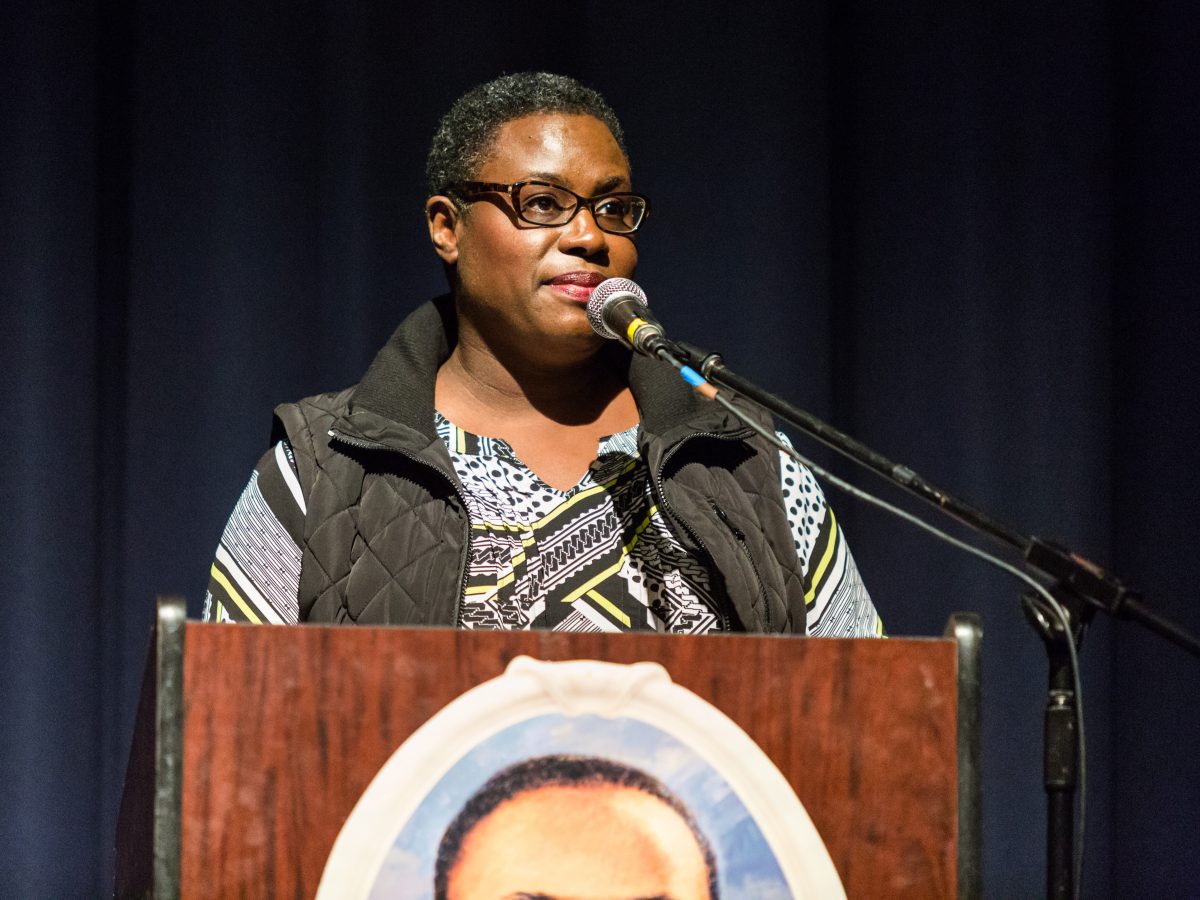
Dr. Mariama Gray, an assistant professor in the Educational Leadership Department at Cal State East Bay, was the keynote speaker at MLK Day 2018.
Speaker: The city’s outward affluence masks a surprising poverty
This year’s keynote speaker at the Davis MLK Day celebration held at the Varsity Theater was Dr. Mariama Gray, an assistant professor in the Educational Leadership Department at Cal State East Bay. The talk was entitled, “Where Do We Go from Here, Davis?”
“Before I talk to you and I want to acknowledge the history of this place that we’re in,” she said. “We’re on Patwin lands. We’re on the land of the Patwin people and in the same way that we remember the ancestors through our story telling and photographs, and remember Dr. King’s legacy through celebrations like these, it’s important that we acknowledge the history of the Patwin people that lived here before we did.”
Today only 1.1 percent of the population of Davis is Native American, she said.
“The Patwin are invisible in the telling of the story of Davis which often begins with the farmlands and the creation of the university,” she said. “As the descendant of enslaved Africans, I can 
often relate to this invisible experience that they’re having here.”
In her scholarship, she said, “I tried make what’s invisible, visible.” The title of her talk, “Where Do We Go from Here, Davis?” is mirrored after MLK’s last book where he asked the community “where do we go from here?”
“In his book, Dr. King argued that we have the resources to eradicate poverty,” she said. His economic vision included better jobs, higher wages, decent housing and high quality schooling.
“In many ways,” she argued, “Davis is like the south in the 1960s.
“The city is full of contradictions,” she said. “Data from the 2016 census shows that the average household income is about $90,000 and for families it’s $137,000. And yet one in four people live below the federal level for poverty. One in four live either without health insurance altogether or public health insurance that we all know is tenuous at best.
“The city’s outward affluence masks a surprising poverty,” she said. “Davis is a well-educated city. At one time it was the second most-educated city in the United States. Those who are doing well believe it is because of their own efforts.”
However, “In Davis like most cities in America, race and class, disability and gender, are predictive of achievement.
“Math is a key gatekeeper for a career in STEM [Science, Technology, Engineering and Mathematics],” she said. “If you look at the District’s test scores for students in third through eighth grade, it shows that African Americans, Latinos, the poor, and students who qualify for special education have markedly lower math achievement than students that are Asian and white, Filipino or biracial.
“If we track student achievement based on parent fundraising, we see wealthier parents ensuring the perpetuation of their children’s privilege,” she continued. “Because we know what happens when schools are under-resourced, it is no surprise that the Davis schools (in the) system that suspend their students the most have students who are browner and poorer, so if Davis is to realize Dr. King’s dream it will need to contend with its inequities.
“What this means is that we have 25 percent of the city that are living below the poverty line,” she said. “People who don’t have the same access that we do to clothing, housing, food and leisure. People who make difficult decisions between food or paying a bill. Between medicine and rent in Davis. Between transportation and clothing.
“We have people of color who have been left behind when it comes to STEM or for college at all,” she said. “People who over time believe that they don’t have what it takes to go onto college, to make it in the world in a high paying job.”
“Dr. King called this forever fighting a degenerating sense of nobodyness,” she said. She said that we have people in our city who do not have access to medicine and cannot see a doctor “until it’s too late.
“We have mostly children of color who are being suspended from school beginning in elementary school,” she said. “If you ask my friends who are mostly people of color, we really believe it’s starting in the preschools.
“We know that just one suspension is predictive of more suspensions,” she said. “Lower reading scores. Drop out. And (it) is associated with involvement in the criminal justice system.
“We have a two-tiered system in Davis,” she said. “I’m not talking about Chicago. I’m not talking about Detroit. I am not talking about Oakland. I am talking about Davis. In our backyard, today, 2018.”
She noted that people of color can get on any buses, drink from any fountains, use any toilets. But she said “there’s still unequal access in our city. There is an income disparity that started generations ago – it’s going to take a lot to get where we want to go.”
—David M. Greenwald reporting

The post MLK Speaker Calls Davis a City Full of Contradictions, Critiques Race Relations appeared first on Davis Vanguard.